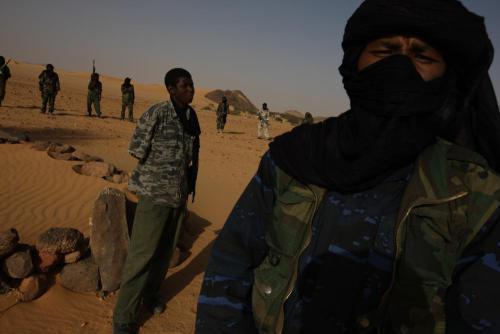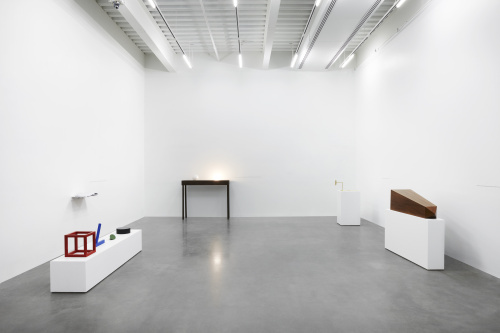Sean Jacobs's Blog, page 558
February 29, 2012
BBC's Special Focus on Africa
To mark 80 years of international broadcasting, the BBC World Service is hosting a day of live programming today. And we're part of it. During the 5-6pm time slot (that's 5-6pm GMT; 12-1pm EST) Focus on Africa will take a look at "the creative energy and entrepreneurship coming out of Africa." Some topics up for discussion are: Whether the world still needs an international broadcaster; What is the role of the BBC?; What are the stories the BBC should cover, and the voices you should hear?; What values and ideas do we all share, and are these the same as our audience?
Sean Jacobs will be guest editing the program (and repping Africa is a Country), looking at the role social media has played in news reporting. He will be joined by blogger Tomi Oladepo.
Twitter handles to follow and participate in the discussion are @BBCAfrica, @BBCAfricaHYS, @bbcworldservice and @AfricasaCountry.
* Update: you can now listen to a recording of the programme here.








February 28, 2012
Music Break. Vincent Segal & Ballaké Sissoko
French cellist Vincent Segal and kora master Ballaké Sissoko (from Mali) recorded the 2009 'Chamber Music' album in Salif Keita's Moffou Studio. Three years later, this is their Take Away Show. (First part here.)








The Ungovernables
It seems rather arbitrary to pick out the African artists from 'The Ungovernables', the New Museum's triennial show. The first thing that appears (if, like me, you start on the fifth floor and work your way down) is a neat stack of Zimbabwean billion dollar bills, put there by Thai artist Pratchaya Phinthong. The show brings together thirty-four different participants (individual artists and collectives). All the artists were born in the 70s and 80s, but beyond this the curation refuses to place the diverse works in any categories.
Two Egyptian artists were, for me, among the show's highlights. Against much of the Egyptian contemporary art recently discussed here, this is art which scrupulously rejects 'revolutionary kitsch'. I'd seen pictures of Iman Issa's work before – colourful shapes like three-dimensional prosthesis from a Mondrian painting (see above) – it didn't communicate much. But in the white cube gallery space the clear lines and colour of these inscrutable monuments have a peculiar impact.
It's difficult to know what to say about Hassan Khan's film "Jewel" (still below) – which shows two men dancing to a Sha'bi soundtrack – it's great. Seriously, hynoptically playful.
Lynette Yiadom-Boakye's portraits achieve a drama which reminds me of Manet's ability to illuminate darkness with a point of light.
On the ground floor the work of the Invisible Borders Trans-African Photography Project covers one wall. We are keen to see more of this ambitious organisation, recently established in Lagos. See their blog on OccupyNigeria here.
In the same room, Nana Oforiatta-Ayim's film 'Nowhere Else But Here' presents a writerly account of a roadtrip with the Invisible Borders group:








Tuareg Nationalism

A quick survey of Western media suggests Tuareg nationalist claims don't carry the same weight as Malian, Nigerian or Algerian claims on Tuareg territory. For example, the current violence in Niger and Mali are covered as either a humanitarian crisis (sympathy for Tuareg refugees), Gaddafi's legacy (rumored weapons support for the rebels from his fallen regime) or through the prism of the War on Terror (armed Tuareg groups get conflated with Al Qaeda in the Maghreb). Meanwhile, if you're still wondering about who the Tuareg is, you have sort of been already introduced to them via the music of Tinariwen, who are unashamed about their nationalist politics. In a recent interview, Tinariwen's Alhousseini Ag Abdoullahi says:
[W]e are military artists! In 1992, we saw that we would be much more useful to the cause by spreading our culture around the world. Today, if we see that our brothers need us armed rather than as musicians, we will go to the front line because we are always ready to answer the call of the preservation of our land, our values and our culture. This is what we do through music and we will do it again with weapons!
Most recently, Tinariwen won a Grammy for Best World Music Album and collaborrated with TV on the Radio. And when you — if you live in the US — were blinking they were discussing their time in Gaddafi's training camps on Colbert Nation.
* For those in or traveling to New York City: They're performing around here on April 12th.








London calling … to the faraway towns of Somalia
Talk about efficiency, how's this for a developmental scheme. First, encourage, both directly and by 'principled non-engagement,' a civil war in a mineral rich area. Make sure thousands are displaced, especially the rural populations. Help to build so-called refugee camps which are located a great distance from everyone's homes and which are places in and around which women and girls become ever more vulnerable, ever more intensely vulnerable … in every way. Let that simmer for a while. Then convene a conference of experts and saviors, not to be confused with Ngugi's feast of thieves and robbers. No, this will be a serious conference of 'people who care'. Be sure to invite everyone who's anyone which means exclude anyone who's nobody which means be very selective in whom you invite. Meet for a couple days, not in the country under discussion, of course. That would cloud your objectivity. You can care from faraway. Announce that this is an opportunity, that the natives must buck up and reform. Announce that the time has come to talk of cabbages and kings — but definitely not queens or princesses of any sort. Then close the conference and declare that, this time, they got it right.
Then, not twenty-four hours later, lead the dash to 'explore' for mineral wealth in the country under discussion. Hey, you've earned it.
Sound familiar? Welcome to Somalia. And welcome, Somalia, to the world order, same as it ever was.
This past weekend, a Very Important Conference was held in London, at Lancaster House, to 'address' the 'Somali situation'. Leading up to the conference, there was much talk — well, there were a few articles here and there — which argued for inclusion of the 'people'. Mary Robinson called for a focus on ordinary Somalis, and described Somali women struggling with structures of hunger and immiseration. Nobody at the conference paid attention. Before the Conference, Mary Harper noted that Somalis actually have better ideas than so-called experts, and definitely better ideas than so-called world leaders, about how to grow the Somali economy and how to improve Somalia's political economies. She too was largely ignored. As Harper pointed out afterwards, the Conference's final communiqué, such as it is, is rife with, or better built on, contradictions. On one side, literally, the document speaks of Somali self-determination. On the other, again literally, it describes which areas of Somali will now be controlled by foreign governments and multinationals.
As for Somali women at this conference, forget about it.
Somali women were not 'forgotten', they were excluded. They were all excluded, from shopkeepers, like Faduma Aden Mohamud; Diaspora activists such as Rahma Ahmed, Amina Souleiman; Somali women community organizers of all stripes, such as Aydris Daar; prominent Somali women members of government, such as Dr. Mariam Aweis Jama and Malyun Sheik Heidar; and the list goes on and on. Women who survived the atrocities of the war and who have been crucial in both construction and reconstruction were literally not given seats at the table.
That was Friday. On Sunday, The Observer reported that "Britain leads dash to explore for oil in war-torn Somalia." So, it's a story with a happy ending. Ask the women of the Niger Delta. They'll tell you. Meanwhile, Somali women continue to organize while London's calling to the faraway towns. Now war is declared — and battle come down.








Reverse Colonization

NPR's European correspondent Sylvia Poggioli filed this piece on Friday. Titled "Portuguese Seeking Opportunities in Former Colonies" it takes a breezy look at how the economic crisis in Portugal has sent the Portuguese to the shores of former colonies in search of employment. A number of such articles have circulated in the international press in the last year. Like the others, Poggioli's article settles for the easy irony of angry everyman opinion in place of in-depth analysis. It makes for a quick, four-minute piece with provocative sound bites (and why should I complain, it gave me something to post about?) but lacks anything but the most superficial sense of history. Enough of my blathering. Let's just dig right in, shall we?
First, this is not about the former colonies, in the plural, it is really about Angola. Angola was the jewel in the Portuguese imperial crown – their India, their Algeria (get the picture?) – the former colony that created the most bitterness at independence that followed a grueling 13-year anti-colonial war.
As Portugal's economy is tanking, Angola's is booming, Angola being the second largest producer of oil on the African continent after Nigeria. Poggioli notes that Portuguese workers are headed to Angola to work in construction, restaurants and hotels. While Poggioli interviews a man on the street standing in line at the Angolan embassy waiting for a visa, she does not note that Portuguese companies – precisely in the industries she names – are invested in Angola and profiting there.
But the relationship between Portugal and Angola is never a straightforward economic one, even when for hundreds of years Portugal exploited the former colony through the slave trade, forced labor (that continued until the 1960s) and unequal terms of trade. These economic relations also did political work in the form of empire for the Portuguese monarchy, the Portuguese republic and the fascist dictatorship of António Salazar. It's worth keeping this political history in mind, and the fact that the institutions and administration of colonial Angola did not include Angolans except at the lowest level of civil service. Colonial rule was an authoritarian system. The institutions of state that the independent Angolan government inherited at independence were not built to facilitate democracy, very much to the contrary in fact.
So when the editor of the financial daily Negócios, Pedro Santos Guerreiro says: "people have to give up some of their beliefs in order to be in a regime that demands more from people than it should," he exposes a huge blind spot in his knowledge of that history. And when one is a foreigner in a country one never exercises the same rights as the local citizens – one does not, for example, vote. Mr. Guerreiro, in a sense, forgets that Angola is no longer a part of metropolitan Portugal.
Then there is the quote from the foreign investment lawyer, Tiago Caidado Guerreiro, who says that "we're being colonized after 500 years by them," referring to investments by Angolans in the Portuguese economy. True, wealthy, politically powerful Angolans have been buying up parcels of Portuguese companies, but that does not equal colonization, not by a long shot. Angolans are not, for example, creating settler colonies in Portugal, or changing the nature and character of local institutions of education, government and culture.
The final concern registered in the article is that this new economic interest (and it isn't just Angola but…surprise!: China, Poggioli is careful to point out) is not so transparent. This is similar to Guerreiro's concern but the space is now Portugal not Angola.
The initial post-colonial fear was manifested as fortress Europe, i.e. constraints on African immigration, the battle over the veil in France, etc. That was how the empire struck back, as one small green collection of post-colonial essays put it. Portugal, as Poggioli represents it, seems roiled by a mix of humiliation, resentment, hyperbole and lack of historical understanding as large numbers of Portuguese again (they did so in the 1950s) migrate to Angola for economic opportunities and Portuguese intellectuals claim that Portugal is being colonized by an authoritarian Angola.
But what is really at stake here? Is it that the Portuguese fear they will be as badly oppressed by those whom they oppressed? As economically dependent on those who were once economically dependent on them? And all they can do is dress up this primal fact in an Atlantic Charter type discourse about democracy? In the end, the only people they really have to blame are their own, democratically elected, leaders, many of whom are quite close to the Angolan President they are critiquing.








February 27, 2012
Music Break. Molare
The most influential African thinker alive
[image error]
At the end of 2011 we contemplated asking you, dear reader, who you think was the most influential African thinker alive. We abandoned the idea for a while because of our thing against lists (except our end of year lists, of course). I got the initial idea from the British blog, Left Foot Forward, which had run a contest to determine "the most influential leftwing thinker of the year 2010/11." The result of the Left Foot Forward contest is here. Based on reader choices, Left Foot Forward came up with the usual suspects (among others, economist and columnist Paul Krugman, columnist Polly Toynbee, journalist Will Hutton, author and academic Owen Jones, and Caroline Lucas, the leader of Britain's Green Party) but also with some strange ones (Tony Blair? Barack Obama? Bernard Henri-Lévy?). On that latter group: it is true that one man's leftwing is another's rightwing. That said, an inevitable blind spot of Left Foot Forward's list was that "left-wing thinker" is synonymous with "Anglo American," and of course heavily British. So, it got me thinking: If we could ask our readers (and critics, and everyone else) to do the same thing, who would you pick?
So here we are. To start things of, we came up with a list of candidates we canvassed internally. Not everyone will be happy with the list, but we tried thinking of a range of intellectuals representing different parts of the continent, not just from one country. As South African writer Zakes Mda recently tweeted: "Zimbabwe compares only with Nigeria in the per capita production of African intellectuals (scholars, writers, scientists, economists etc.)" In fact, an earlier draft of the List was heavily South African and Egyptian. (That draft was not supposed to be up and one reader responded in kind. It's been corrected.)
We confess this list is subjective and that is why we have a second round where your suggestions will make up the choices.
Others wanted to know why we're not including people on twitter: Our response is that we are not sure 140 characters make you "an intellectual." A lot of stuff on twitter, including our own tweets, is half-baked and amounts to what Americans call "carnival barking" (in the service of traffic or attracting followers), so it is better to leave that alone. (Of course, some of the people below have twitter accounts.)
A next consideration was: the list of names below might be well-loved voices among the intellectual chattering classes, but how influential are they really? For example, the Comaroffs are certainly academics whom we all respect, but how many people would even have heard of them as opposed to intellectuals who write in the popular press and shape thinking more broadly perhaps. We wondered about that, but realized we could not find a serious thinker who could rival them while writing in the popular press.
The polls will open today and you can vote till next Monday. Once polls close, we will arrive at a shortlist of five. Then it gets interesting: We will have a second, separate round of voting based on your recommendations. That is while you vote in round one, we'll compile a list of ten names from your suggestions in the comment section, on our facebook page and on Twitter. Candidates who are already on the first list, won't be included on the second. A second vote/poll will proceed and we'll announce the result. We will then combine the top five vote takers from the second list with the top five vote takers from the first list. There will then be a third and final round of voting based on the new combined list that will take one week. After that we will announce the overall winner. How's that? So here are our candidates for round one:
Take Our Poll








A Spaza Shop Job
Spot the references in this music video by Ollie Nhlabatsi for South African duo Spaza$hop Boyz. (We can think of some.)
In a way, postapartheid South African music culture is one big cut and paste job where one buys and appropriates, like going into a spaza shop where you take stuff off a shelf, you go home and cook it together. Spaza$hop Boyz' first video for their single 'Rehab Tony' clearly rips off Die Antwoord and Spoek Mathambo. Sometimes the recipe works.
Via Amakipkip.








February 25, 2012
The sound of Joburg label Iapetus
From Zetina Mosia's upcoming album "The RoundAbout", this track: 'Lately'. We've said this before, but the Johannesburg label Iapetus is an exceptional breeding ground for South African artists — remember Fifi the Rai Blaster, Yugen Blakrok, Robo the Technician or Gin i Grindith — with a special mention for Kanif, the producer behind many of the songs.








Sean Jacobs's Blog
- Sean Jacobs's profile
- 4 followers
















